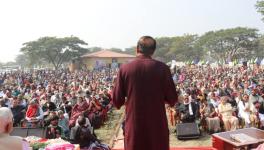Psuedo-Secularism and Secular Sectarianism: How Liberals and Progressives Contribute to Rise of the Right

Liberals and other progressives have often been accused of ‘pseudo-secularism’, meaning ‘appeasement’ of the minorities and victimisation of the majority when law demands that everyone be treated equally. However, it is now a well-known fact that religious minorities, specially the Muslims have been steadily slipping in the socio-economic indicators and there never was any appeasement. One can be sure that Social Democrats and Liberals did not practice the kind of ‘appeasement’ they are accused of but what they did practice was secular sectarianism that contributed to the appeal of ‘pseudo-secularism’ in the popular consciousness.
The way empowerment, justice and equality came to be understood over a period of time in the dominant liberal-secular and Left-progressive narratives allowed the consolidation of the Right. The inconsistencies and certain shallowness of secular politics introduced what I refer to as the logic of secular sectarianism. Secular sectarianism, in turn, contributed to the narratives of appeasement gaining larger traction. These groups that introduced and practised a secular sectarian logic included the liberal intellectuals and Constitutionalists, global postcolonial scholarship and discourse, feminist, Muslim and Dalit-Bahujan mobilisations. Each of them in varied manner contributed over a period time for a cumulative and consolidated practice of secular sectarianism that divided social groups and allowed for narratives and practices that could eventually be appropriated by the Right.
Postcolonial interventions, such as the ‘Subaltern Studies’ among others, contributed to the ‘cult of subaltern’, who could not be interrogated from the ‘outside’ as that was construed at best as patronage and at worst as colonisation. Every act and choice of the subaltern was to be dignified within the context of the Subaltern’s life and world in order to make the ‘subaltern speak’. Even subalternity itself was to be dignified and not thought of as mere victimisation or vulnerability, so that the subaltern could protest even in the most adverse of the condition, or rather there was subversion even in the most innocuous looking acts. What it did contribute to was a discourse of dignity, even if real-time living conditions and concrete opportunities for mobility were shrinking. In fact, after a point the ‘subaltern talk’ was compensating for the subaltern emancipation. It contributed to a condition where verbal assertion was disconnected from material impoverishment.
Similarly, the Dalit-Bahujan politics in liberal institutional spaces such as the universities contributed by asserting against the same liberal spaces because they had to act ‘as if’ they were equal when in actuality there continued to be a large gap in social, educational and economic terms. A Dalit-Bahujan schooled in local schools had to not only compete with those from higher echelons but had to also act ‘as if’ he was already equal in all respects. Again such an assertion did not create concrete institutional mechanisms to compensate the existing inequalities in academic potential but to a denial of existence of such gap itself in order to restore their dignity.
This kind of a shift can be seen in feminist discourse too. For instance, in the case of prostitution, it began with a demand for its abolition as it meant sexual violence and exploitation of women, it was forced due to existing structural conditions of poverty and deprivation, but from here, it moved to demanding it be recognized as sex work, demanded its legalisation and de-criminalisation so that they get saved from routine harassment. It became more about choice than about exploitation, more about legitimate skill and dignity than violence. In fact, unproblematically, referring to it as violence was itself seen as patronage and a male gaze.
Finally, the Liberal discourse of ‘freedom of speech and expression’ was based on the idea that there was no final truth and meanings were only contextual. It introduced relativism and falsification. Ethical concerns gave way to discourse analysis.
In various ways one can connect the rise of the Right to the logic present in such interventions. Right too today asserts and any denial is seen as a question of dignity. Assertion of a glorious ancient past and slogans of ‘India First’ and ‘Mera Bharat Mahaan’ are assertions in themselves for dignity whereas pointing to concrete incivilities and inequalities are seen as assaults on national pride. Exploitation present in caste-based occupations today is being dignified in the name of vocational education and tradition. They are being legitimised and modernised in New Education Policy. Finally, ideas of relativism and falsification have contributed to post-truth and ‘alternative facts’. Fake news is seen more as entertainment than through an ethical lens. When the subaltern moved Right and got communalised, we did not have a politically legitimate language to critically intervene. It led to more space for perception and representation that created an appeal to a discourse of appeasement and pseudo-secularism. What we now need is to overcome secular sectarianism and a logic and discourse that cannot be so easily appropriated by the Right.
(Ajay Gudavarthy is Associate Professor at the Centre for Political Studies in Jawaharlal Nehru University, Delhi. Views expressed are personal.)
Get the latest reports & analysis with people's perspective on Protests, movements & deep analytical videos, discussions of the current affairs in your Telegram app. Subscribe to NewsClick's Telegram channel & get Real-Time updates on stories, as they get published on our website.
























